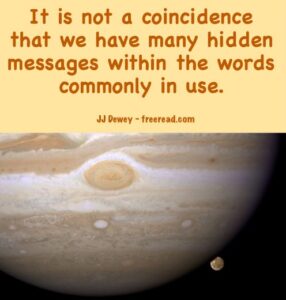
The Nicolaitans
“But this thou hast, that thou hatest the deeds of the Nicolaitans, which I also hate.” Rev 2:6
The voice of the Master gives another word of praise, and a somewhat odd one at that. The disciple is complimented for hating the same thing that God hates. But wait! We are not supposed to hate anything, are we? And yet a voice representing Christ or God speaks of his own hate.
Now one could argue that Christ would never hate and perhaps this is merely John’s interpretation of the mind of God, putting a thought of God in language to which the seeker can relate.
Yes, it may be true that in the higher spiritual spheres hate may not exist and the reason is that it is not a necessary means of communication there; but when any intelligence, whether man or God, descends to the earthly sphere, the language of emotion applies to all.
I think, then, we can agree that the voice of God clearly states that it disapproves of the Nicolaitans in a way that we would interpret as hate – that is, if such a God were a human being speaking with us.
So what is it about the Nicolaitans that cause the emotion of hate to come not only from the aspirant, but from the voice of God itself?
Scholars have difficulty with this because there is little written about this group. Most of them, however, believe they were either founded or inspired by the disciple Nicolas who is mentioned once in the Bible. In Acts 6:5 his name is given as one of seven called to assist the Twelve Apostles.
It is thought by some that he apostatized from the teachings of Christ and must have started a reprobate group after his name. Actually, the few writings we have from the early church fathers tell a different story. Here is an interesting account recorded by Eusebius giving a story told by Clement of Alexandria about Nicolas:
This man (Nicolaus), it is said, had a young and lovely wife. And when he was reproached by the apostles, after the ascension of the Saviour, for jealousy, he brought her into their midst and bade anyone marry her who wished. For this action, it is said, was in accordance with that saying (of his), ‘One ought to abuse the flesh;’ and, as a matter of fact, the members of his sect have followed both example and precept absolutely and without question, and commit fornication freely. But for my part, I understand that Nicolaus had intercourse with no woman except his wife; and that, as regards his children, the daughters grew old in a state of virginity, while his son preserved his chastity. Such being the case, when he brought the wife, whom he jealously loved, publicly into the midst of the apostles, it was to renounce his passion; and it was self-control, in the face of pleasures men eagerly seek, that taught him to say ‘abuse the flesh.’ For, I imagine, in accordance with the Saviour’s command, he did not wish to serve two masters, pleasure and the Lord.
The Nicolaitans then pursued the unrestricted license to pleasure and gratification in food, sex or whatever they fancied. To justify their actions they cited the story of Nicolas and his willingness to give up his wife to marry, or pleasure, any who wanted her. Since no one condemned him for this, then thy reasoned it must be okay to share sexual favors, have group sex or whatever.
The interesting thing is the Nicolaitans confiscated the name of a man who was doing his best to control passion and corrupted his teaching to give them license to have no self-control whatever.
In the above quote we are told that in deed Nicolas was a very ascetic man who believed in sexual purity. He only had sex with his wife and his children were virgins and chaste.
So it turns out that those who used his name to promote their doctrine of licentiousness were claiming to be followers of Nicolas, but were not. Indeed they were the opposite of Nicolas, or anti-Nicolas.
This point sounds familiar, does it not? It does indeed when we go back a couple verses to these words spoken to Ephesus:
“…thou canst not bear them which are evil: and thou hast tried them which say they are apostles, and are not, and hast found them liars.” Rev 2:2
This makes sense when we realize that the true seeker cannot bear false apostles, but neither can he tolerate those who falsely use the name of Nicolas, an assistant to the apostles.
While it is true that the Master doesn’t approve of either extreme – asceticism or promiscuity – neither was offensive enough for him to use the word hate. Jesus did not show hate toward the prostitutes of his time. What offends the Spirit much more than indulging in the pleasures of the flesh is taking the teachings of a just man, corrupting them, and leading the people in the opposite direction. We are told that this happened with false apostles, and that there are those who corrupt the teachings of Christ and are antichrist. Finally, there are those who corrupt teachings of lesser saints such as Nicolas and hypocritically use his name.
Another hint as to what is so disturbing to the voice of the Spirit is found in the name itself. Nicolaitans, derived from Nicolas, comes from two Greek words. The first is NIKAN, which means “victory or conquest.” The second is LAOS, which means “the people.” This implies one who is such a powerful personality or of such powerful authority that he dominates the people. Common people can easily accept the word of a powerful leader above their own inner voice.
It is quite possible then that the meaning of the name of the Nicolaitans reveals that God is disgusted with the fact that men often set themselves up as an authority over the people and in doing so claim to be spokesmen for God. This causes them to replace the inner voice of God among the people with their own voice and ideas, thus deceiving the people out of their own inner contact and free will.
We can conclude we are on the right track in identifying the things that God hates because they are the same two things that Jesus hated, which were:
(1) Those who were in charge of the temple claimed to be the rightful heirs to administering its services. Instead of keeping with the original intent set forth by Moses, David and Solomon, they corrupted it to their own ends.
Jesus hated this and called them a “den of thieves” and made a whip and chased them out.
(2) Jesus hated the hypocrisy of the leaders who would not let the people think for themselves. These leaders claimed to speak for God and that they should be followed without question.
To them Jesus said:
“But woe unto you, scribes and Pharisees, hypocrites! for ye shut up the kingdom of heaven against men: for ye neither go in yourselves, neither suffer ye them that are entering to go in. Woe unto you, scribes and Pharisees, hypocrites! for ye devour widows’ houses, and for a pretence make long prayer: therefore ye shall receive the greater damnation.” Matt 23:13-14
Jesus never expressed disgust toward the typical sinner, but had compassion toward them. But he did express very negative feelings toward unjust leaders.
The hate expressed by the voice of the Master toward the Nicolaitans was merely a reiteration of the disgust Jesus had toward the leaders in his day.
It makes sense that the aspiring disciple, who has gained a sense of spiritual freedom, would hate the doctrine of the Nicolaitans who would seek to corrupt past teachings and force followers to conform to that corruption.
It is interesting that misplaced hate still runs rampant in the churches today. They will tolerate that which God hates – corruption and unjust authority – while hating any type of sexual talk or indiscretion. Promiscuity is not the way of the disciple, but it is a much lesser wrong than that which is committed by those who seek to control the minds of men and take away their free agency.
Don’t be afraid to take a big step if one is indicated. You can’t cross a chasm in two small jumps. David Lloyd George (1863 – 1945)
Dec 30, 2006
Easy Access to All the Writings
For Free Book go HERE and other books HERE
JJ’s Amazon page HERE
Check out JJ’s Facebook Group HERE
Follow JJ on Twitter @JosephJDewey HERE
Check out JJ’s videos on TikTok HERE








